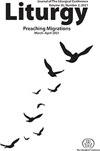When a Brand is Tainted: The Ethics of Song Selection in Corporate Worship
IF 0.3
0 RELIGION
引用次数: 0
Abstract
Our very brief story begins on a typical day in Jacksonville, Florida, in 2010—hot, humid, with a chance of scattered showers in the afternoon. I was deciding what I wanted to eat for lunch, so I pulled my vehicle into the drive-through at Chick-fil-A and ordered my usual: a fried chicken sandwich, waffle fries, and sweet tea. I then ate the meal and enjoyed it. That’s the end of the story. I told you it was short. The simplicity of this scenario changed drastically in 2011. Chick-fil-A gained the national spotlight when its president, Dan Cathy, defended the company’s monetary donations to organizations supporting "biblical marriage" (i.e., one man and one woman). Between the news cycle commentators, op-ed columnists, bloggers, and social media pundits, Chick-fil-A went from a well-respected fried chicken powerhouse to an ethical quandary for some, and a rallying cry for others on both sides of the proverbial fence. The chicken sandwich was no longer just a chicken sandwich. The ubiquity of social media and its algorithmic echo chambers fueled the controversy. Even today—many years after Cathy’s public comments—the Chick-fil-A brand is treated with adoration from political and theological conservatives and with suspicion from liberals and progressives. In 2019, Chick-fil-A modified its charitable giving strategy to focus on education, homelessness, and hunger. In doing so, they ceased donations to groups scrutinized by the media such as the Salvation Army and the Fellowship of Christian Athletes. However, despite their best efforts to pivot in response to controversy, for many, Chick-fil-A remains a tainted brand. Among critics and questioners of Chick-fil-A, the topic of how to respond ethically proved to be a dividing point. In 2018 (and updated in 2022), Noah Michelson, Editorial Director of HuffPost Personal, penned the article “If You Really Love LGBTQ People, You Just Can’t Keep Eating Chick-fil-A.” A large photo of a spread of Chick-fil-A food adorns the article, with the biting subtitle “queerphobia never tastes good.” In no unclear terms, he contends that LGBTQ persons and allies need to choose where their loyalties lie—“with your community or with your stomach.” Marie Whitaker is not as hard-lined, offering her thoughts in the NBC News article, “I’m black and gay and I still eat at Chick-fil-A.” She summarily quips, “The next time I treat myself to the chain’s sinful but tasteful fried chicken and white bread, I will give triple the money I spend to the marriage equality effort.” In a similar pivot, Executive Director of Baptist News, Mark Wingfield, refused to boycott the restaurant, instead suggesting readers redirect their frustration by boycotting politicians who work against the rights of LGBTQ people.当一个品牌被玷污:企业崇拜中的选歌伦理
我们非常简短的故事始于2010年佛罗里达州杰克逊维尔的一个典型日子——炎热潮湿,下午可能会有零星阵雨。我正在决定午餐想吃什么,所以我把车开进了Chick-fil-A的免下车通道,点了我通常吃的东西:炸鸡三明治、华夫饼薯条和甜茶。然后我吃了饭,很享受。故事到此结束。我告诉过你它很短。2011年,这种情况的简单性发生了巨大变化。Chick-fil-A的总裁Dan Cathy为该公司向支持“圣经婚姻”(即一男一女)的组织捐款辩护,从而引起了全国的关注。在新闻周期评论员、专栏作家、博客作者和社交媒体专家之间,Chick-fil-A从一个备受尊敬的炸鸡巨头变成了一些人的道德困境,也成为了众所周知的围栏两边其他人的号召。鸡肉三明治不再只是鸡肉三明治。社交媒体及其算法回音室的普遍性引发了争议。即使在凯茜公开发表评论多年后的今天,Chick-fil-A品牌仍受到政治和神学保守派的崇拜,自由派和进步派的怀疑。2019年,Chick-fil-A修改了其慈善捐赠战略,将重点放在教育、无家可归和饥饿问题上。在这样做的过程中,他们停止了向救世军和基督教运动员联谊会等媒体关注的团体捐款。然而,尽管他们尽了最大努力来应对争议,但对许多人来说,Chick-fil-A仍然是一个有污点的品牌。在Chick-fil-A的评论家和提问者中,如何合乎道德地回应的话题被证明是一个分歧点。2018年(并于2022年更新),《赫芬顿邮报》个人版编辑总监诺亚·迈克尔森写了一篇文章《如果你真的爱LGBTQ人群,你就不能一直吃Chick-fil-A》。文章上装饰着一张Chick-fil-A食品的大照片,并配上了尖刻的副标题“同性恋恐惧症从来都不好吃。”,他认为,LGBTQ人士和盟友需要选择他们的忠诚所在——“与你的社区还是与你的胃。”玛丽·惠特克并没有那么强硬,她在NBC新闻的文章中表达了自己的想法,“我是黑人和同性恋,我仍然在Chick-fil-A吃东西。”,“下次我吃这家连锁店罪恶但美味的炸鸡和白面包时,我会把花在婚姻平等上的钱增加三倍。”同样,浸礼会新闻执行董事马克·温菲尔德拒绝抵制这家餐厅,相反,建议读者通过抵制那些反对LGBTQ人群权利的政客来转移他们的沮丧情绪。
本文章由计算机程序翻译,如有差异,请以英文原文为准。
求助全文
约1分钟内获得全文
求助全文

 求助内容:
求助内容: 应助结果提醒方式:
应助结果提醒方式:


